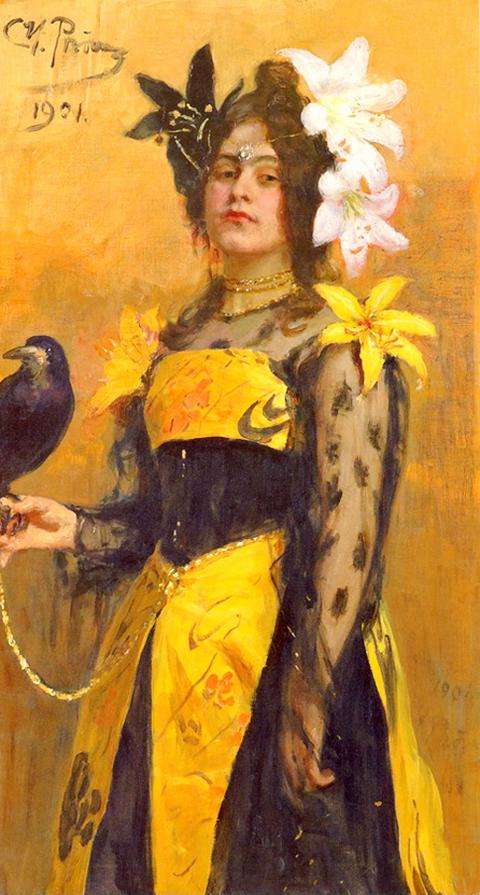Chinese Practice
畫蛇添足
(hua4 she2 tian1 zu2)

Photo: Wikimedia Commons
照片:維基共享資源
drawing legs on a snake
英文片語「to gild the lily」(替百合花鍍金)源自英國文豪莎士比亞的劇作《約翰王》。此片語現今的用法,實出於原文的錯誤引用。
將某物鍍金指的是在其表面覆上一層薄薄的金子或金箔,使之賞心悅目。鍍金在鐵製胸針或木碗上確有其道理。但如果是鍍金在一件本來就已經很美的東西上,就很奇怪了,例如鍍金在百合花上。此片語所隱喻的意義是指為了使已很吸引人的事物更加吸引人的多餘的、不必要的努力。但其實莎翁並未寫過「to gild the lily」這句話,他實際上寫的是《約翰王》劇中主人公索斯伯里伯爵說的話:「鍍上純金、畫在百合上、在紫羅蘭上噴香水、把冰弄光滑、或在彩虹上加上另一個顏色……是浪費和荒謬的過量。」
因此我們可知,那流傳下來的被錯誤引用的片語,是把第一句的第一個詞「鍍」拼裝到下一句的第二個詞「百合」。正確的引用應是「畫在百合上」,且的確曾有人引用過,但如今卻是很少聽到了。
成語「畫蛇添足」跟「to gild the lily」的語意有異曲同工之妙。此語出自《戰國策.齊策二》中一個故事,描述有位官員賞了壺酒給辦事的手下喝,但人多酒少不夠分配,眾人便議定以畫蛇比賽來決定,看誰最快在地上畫好蛇,便能贏得那壺酒。有個人最先把蛇畫好了,得意之餘,再多添了幾隻腳,炫耀時間仍有餘裕。但這時另有人也把蛇畫好了,便將酒一把搶走,說你畫的根本不是蛇,因為蛇並沒有腳。此成語引申有多此一舉、弄巧成拙之意。(台北時報編譯林俐凱譯)
做到這裡見好就收,不要畫蛇添足,以免反而壞了事。
(Stop there, there’s no need to gild the lily. You’ll spoil it.)
為了贊助商的要求硬扯上這個產品,這對原本合理的劇情來說真是畫蛇添足。
(Doing this product placement to fulfil the sponsor’s demands spoils what was originally a perfectly reasonable script.)
英文練習
To gild the lily
The phrase “to gild the lily” owes its origin to William Shakespeare’s play King John. In its present form, however, it is the result of a misquotation of the original text.
To gild something is to cover it with a thin layer of gold or gold leaf to render it more pleasing to the eye. It would make sense to gild an iron brooch, for example, or a wooden bowl. It does seem odd to gild something already beautiful in its natural state, such as the lily.
Herein lies the metaphorical meaning of the phrase, that is, the superfluousness of the attempt to make attractive that which is already so. It’s just that Shakespeare never actually wrote it. Instead, he has his protagonist, the Earl of Salisbury, say, “To gild refined gold, to paint the lily, to throw a perfume on the violet, to smooth the ice, or add another hue unto the rainbow… is wasteful and ridiculous excess.”
In other words, the phrase as it has been passed down to us erroneously joins the first part of one idea to the second of the next. The correct version, “to paint the lily,” an actual quote from the play, was indeed once used. Today, it is rarely heard.
The Chinese idiom 畫蛇添足 is actually very similar in meaning to “gild the lily.” It comes from a story that can be found in the Strategies of the Qi State chapter of the Strategems of the Warring States. This story relates how an official rewarded workers with a pitcher of wine. The workers, concerned that there was not enough wine to go around, decided to have a contest to see who could draw a snake the fastest, the winner getting to keep the whole pitcher. One person drew a snake very quickly, but then started to get carried away, and added legs. While he was doing this, another person had finished his snake, and claimed the prize. “What you drew there,” he said, “was no snake. Snakes don’t have legs.”
The idiom has come to refer to the danger of trying to be too clever.
(Paul Cooper, Taipei Times)
Lose the hat. Your outfit is perfect as it is. Why gild the lily?
(把帽子脫掉吧。你這身打扮已經很完美了,何必再多此一舉?)
That sentence is already quite powerful. Adding that extra example would just be gilding the lily.
(這個句子已經很有力了。再加上其他例子只會是畫蛇添足。)

A: In its latest annual travel guide, Bloomberg recommended two restaurants in Taipei: Golden Pig barbeque from South Korea and two-Michelin-star restaurant A. B: Also, tourists should definitely try Taiwanese cuisine while they’re here. Mountain & Sea House, Shin Yeh Taiwanese Cuisine, and Fujin Tree Taiwanese Cuisine & Champagne are good options. A: For local snacks, Fu Hang Soy Milk, Fu-Ba-Wang Pigs’ Knuckles Restaurant, and Wang Ji Rice Dumplings are all very popular. B: And the gold medalists of the 2025 Taipei International Beef Noodle Festival — Yun Shui Kitchen, The Howard Plaza Hotel Taipei, and Come N’ Eat

A: Bloomberg just released its annual travel guide, titled “25 Best Places to Travel in 2026.” What were the best Asian destinations? B: There were actually six Asian hotspots: Taiwan’s Taipei, Malaysia’s Penang, Kazakhstan’s Almaty, Indonesia’s Rote Island, India’s Tiger Reserves, and Oman. A: With its mix of traditional food and modern cuisine, Taipei has become a rising food capital in Asia. B: As Bloomberg reported, “Taiwan is a place that bubbles up in culinary conversation because of its famed beverage, bubble tea, and its early adoption of modern night markets.” A: And Din Tai Fung has now

Facing relentless flooding and rising expenses, Dumble Farm in England has stopped selling milk and started an unexpected but therapeutic venture: cow cuddles. In 2022, the owners sold most of their dairy cows and began letting visitors spend time brushing, petting, and even hugging specially trained Highland cows for 95 pounds per session. This unusual shift reflects the rise of the so-called healing economy, a sector where animal-assisted experiences are marketed as emotional remedies for stress and burnout. While dogs and cats remain the most common therapy animals, cows are gaining popularity for their calm nature. At Dumble Farm, only cows that

Owls have long fascinated people with their distinctive appearance and mysterious habits. These nocturnal birds possess large, round eyes and a flat facial disc. Their feathers come in shades of brown, gray, or white, helping them blend easily into the darkness. The most remarkable trait of owls is that they can turn their heads without damaging blood vessels. Contrary to popular belief, they can only rotate their heads up to 270 degrees, not 360 degrees. Owls have 14 cervical vertebrae, which is twice as many as humans. This special physical structure compensates for their inability to move their eyes within their